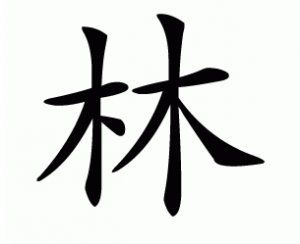Welcome to my world where a Lim is also a Ling. My surname is actually Lim but it was registered as Ling in my birth certificate. I was born in a very small town in Sarawak called Binatang which means animal in Malay. This is a predominantly Foochow town. So when I was born, my Hokkien parents gave the nurse at the clinic my name written in Chinese characters. The nurse, being a Foochow, translated the name into a Foochow name and that was how I ended up with a Foochow though I am 100% Hokkien.
Chinese surnames are often spelt differently under different dialects. For my Chinese surname, it is spelled in this part of the world as Lim in Hokkien, Ling in Foochow, Lam in Cantonese and Nee in Henghua.
Lin is a pinyin transcription of my surname. The literal meaning of this surname is “forest” or “woods”.
The majority of people with this surname are concentrated in the south-eastern coastal regions of Fujian and Taiwan. Among the overseas Chinese, the surname Lin (also transcribed as Lam, Lum, Lim or Liem) may be more common than in China because many overseas Chinese have origins in Fujian. This is due to the migrating Fujian Chinese seeking their fortunes particularly in Southeast Asia. In Hong Kong and Vietnam, the name most often takes the form “Lam”.
Lin is the second most common surname in Taiwan, with a population of 9% Taiwanese (2.1 million, 2005 estimate), behind only Chen. In mainland China (except Fujian), Lin is less common.
There is a legend as to the origins of this surname.
During the reign of Shang Zhou, 1154 BC to 1122 BC, the last king of the Shang dynasty (1783 BC to 1122 BC) had three of his uncles advising him and his administration. The king’s uncles were Bi Gan (also spelled Pi Kan), Qi Zi, and Wei Zi. Together the three men were known as “The Three Kindhearted Men of Shang” in the kingdom. Bi Gan was the son of Prince Ding, son of Emperor Shang and, thus, was King Zhou’s uncle.
Unfortunately, Zhou was a cruel king, and the state’s citizens suffered tremendously. His three uncles could not persuade him to change his ways. Failing in their duty to advise the king, Wei Zi resigned. Qi Zi faked insanity and was relieved of his post. Only Bi Gan stayed on to continue advising the king to change his ways. “Servants who are afraid of being killed and refrain from telling the truth are not righteous,” he said. This put him in danger of incurring the king’s wrath. Bi Gan stayed at the palace for three days and nights to try to persuade the bloodthirsty and immoral king to mend his ways.
The stubborn king would not relent and had his uncle, Bi Gan, arrested for treason. Upon hearing this, his pregnant wife (surname Chen) escaped into the forest to protect her unborn child from death. She knew, in time, the king would execute Bi Gan and his entire family. The baby was born in the forest. Alone with no one to help, she grabbed hold of two trees and gave birth to a baby boy whom she named Jian. When she reached the nearest town, she gave her child the surname Lin (Chinese character depicted by two trees).
Before long, Shang Zhou was overthrown and killed by Zhou Wu Wang (Zhou Dynasty, 1134 BC to 256 BC). Zhou Wu Wang knew about the courageous court adviser Bi Gan and sought his wife and child. When he found them, he honoured them in respect of Bi Gan. The mother and child were restored back into the royal family. The new king conferred the surname Lin (meaning woods or forest) on Bi Gan’s son, because he was born in some woods.
In Singapore, apart from the common spellings “Lim” and less common “Lam”, is the extremely rare spelling “Lynn”, not related to the Irish and English surname with the same spelling. The Singaporean “Lynn” family still uses the 林 character.
According to an unofficial count undertaken by the American company infoUSA, “Lam” is the third most common surname found in Canadian telephone directories.
Indonesians of Chinese ancestry with this surname usually spell it as “Liem.”
A common Japanese surname, Hayashi, is written with the same character 林, also meaning forest.
So my surname in Japanese is Hayashi. That’s cool!
 CY@CY Says Welcome to my dreamscape. Where a Lim is also a Ling.
CY@CY Says Welcome to my dreamscape. Where a Lim is also a Ling.

Hi, Im James Thng, read thru your website by chance when Im trying to search on Bi Gan’s son, and those who is directly related to Zi royal family in Shang dynasty. My sir name is Tang 汤, so we are actually under the same royal family. Whats ur name? feel free to add me to msn at wlthng8@hotmail.com. Im from Singapore. Hear from you soon. Take care.